|
|
|
Sort Order |
|
|
|
Items / Page
|
|
|
|
|
|
|
| Srl | Item |
| 1 |
ID:
183018


|
|
|
|
|
| Summary/Abstract |
Sting operations can potentially thwart terrorist plots, but could also threaten civil liberties and alienate communities, making them a critical subject for counterterrorism research. Yet despite considerable research on U.S. cases, little is known about terrorism stings elsewhere. How common are such cases abroad, and how many feature strong entrapment claims or result in entrapment-related acquittals? In this study, data are gathered about non-U.S. terrorism stings, each of which is evaluated for entrapment indicators. Results show that, contrary to claims of American exceptionalism, terrorism stings could be identified in twenty-one countries, and the average number of entrapment indicators per case is similar between the U.S. and several countries. In addition, several non-U.S. cases present entrapment claims as strong as some of the most-criticized U.S. cases. However, relatively few non-U.S. terrorism stings (fifty-one) could be identified, while there are 156 U.S. cases. In addition, unlike in the U.S., courts have acquitted defendants on entrapment grounds in a high proportion of non-U.S. cases. Political, cultural, and legal differences between the U.S. and other countries, and certain cross-national commonalities, are identified as likely accounting for these results. Potential implications of these findings for terrorism prevention and legal reform are considered.
|
|
|
|
|
|
|
|
|
|
|
|
|
|
|
|
| 2 |
ID:
160371
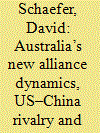

|
|
|
|
|
| Summary/Abstract |
Canberra’s exposure to great-power conflict is arguably more complex and ambiguous than during the Cold War. Drawing from scholarly literature on entrapment and recent developments in outer-space security, this article explores Australia’s position in a hypothetical US–China war over Taiwan. The shifting military balance in outer space, recent war games by the US military and regional trends in defence planning all raise the possibility of a scenario opening with Chinese cyberattacks against information networks shared between Australia and the USA. As a result of its growing dependency on space systems, Australia may be entrapped in a novel way which poses questions for scholars and policymakers. These findings should encourage further study of regional crisis management, with the need for a shared understanding of strategic behaviour in outer space and cybernetworks.
|
|
|
|
|
|
|
|
|
|
|
|
|
|
|
|
| 3 |
ID:
166662
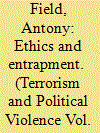

|
|
|
|
|
| Summary/Abstract |
This article examines domestic counterterrorism sting operations in the USA. It considers why critics consider these operations unethical and illegitimate. In particular, it looks at claims that counterterrorism sting operations have entrapped innocent people. This article explains why the U.S. courts have rejected claims of entrapment. It discusses different standards of entrapment used by the U.S. courts and sets out how these standards apply to counterterrorism sting operations. The article will show how key pieces of evidence convinced the courts that the targets of sting operations were predisposed towards terrorism. As a result, defendants were not able to mount successful entrapment defenses. By the end of the article, the reader will have a better understanding of the ethical and legal safeguards governing counterterrorism sting operations in the USA.
|
|
|
|
|
|
|
|
|
|
|
|
|
|
|
|
| 4 |
ID:
156082
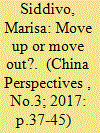

|
|
|
|
|
| Summary/Abstract |
China is equipping itself with a mid-long-term strategy to sustain its manufacturing sector in the face of potential challenges brought about by “disruptive” technologies. According to most analysts, disruptive technologies such as 3D printing, the Internet of things (IoT), big data, and robotics are going to modify the “shop floor” and re-allocate the functions and roles of firms empowered in the global value chains (GVCs). In China, scholars, state officials, and the entrepreneurial community have profoundly analysed the impact that disruptive technologies can exert on their firms’ role in the global value chains, reaching the conclusion that the country has to frame a policy to hedge that risk. This paper aims to provide an overview of the debate stirred up by the confrontation of the national manufacturing sector with the introduction of new technologies. The debate, which has involved many institutional and economic actors, has influenced the industrial plans recently drawn up by the Ministry of Industry and Information Technology (MIIT).
|
|
|
|
|
|
|
|
|
|
|
|
|
|
|
|
| 5 |
ID:
167451
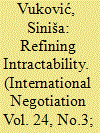

|
|
|
|
|
| Summary/Abstract |
Intractability is generally associated with prolonged tensions, employment of destructive means, suspicion and mistrust, inflammatory rhetoric and polarized solutions that are usually presented as ultimatums. Existing studies on intractability have emphasized the resistance to solution as a crucial indicator of intractability, and subsequently explored the phases through which intractability evolves and key characteristics these conflicts possess. What is largely missing is a nuanced explanation of at what point resistance turns into intractability. Building on earlier studies from social-psychology on entrapment in negotiations this article will develop a novel conceptual framework of entrapment as a precondition to intractability, and apply it to assess the causes and consequences of entrapment in an escalating conflict using the Syrian Civil War as a case study. The study will demonstrate that resistance to solution, which is a consequence of entrapment, does not automatically lead to intractability.
|
|
|
|
|
|
|
|
|
|
|
|
|
|
|
|
| 6 |
ID:
157109
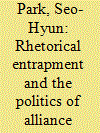

|
|
|
|
|
| Summary/Abstract |
This article is about rhetorical framing and its effects on foreign policy outcomes – specifically in intra-alliance relations. It argues that leaders’ attempts to change the framing of existing security concepts alter the context – and cost – of alliance cooperation. In particular, I highlight the mechanism of rhetorical entrapment as the causal link between initial rhetorical action and the changed context of alliance cooperation. While previous studies of rhetorical entrapment have focused on individual-level reputational costs – such as moral shaming or political backlash when hypocrisy is exposed – I focus on the socially constructed nature of political rhetoric and the consequences of language use. That is, I explore why leaders are compelled to choose certain security rhetoric in the first place and how social resonance and audience receptivity can present unintended political constraints and hidden costs. In this way, the findings from this article contribute to two separate bodies of work in the field of International Relations that have yet to be examined closely in tandem: the role of foreign policy rhetoric employed by leaders as part of their political legitimation strategies, and the domestic politics of alliance cooperation. Through comparative case studies of Japan and South Korea prior to and during the early stages of the Iraq War, I demonstrate the role of rhetorical entrapment in explaining the politics of alliance cooperation.
|
|
|
|
|
|
|
|
|
|
|
|
|
|
|
|
| 7 |
ID:
114078
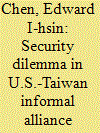

|
|
|
|
|
| Publication |
2012.
|
| Summary/Abstract |
This article has two main goals, one is to explore whether the improvement in cross-Strait relations has increased both the risk of entrapment for Washington and the fear of abandonment for Taipei since 2008, and the other is to examine why the United States provides Taiwan with strategic reassurance. The two main international relations (IR) theories applied in this article are Charles Lipson's theory of informal alliance and Glenn H. Snyder's theory of security dilemma in alliance politics. Taipei may be hoping that when cross-Strait negotiations move from economic and cultural issues to politically sensitive ones, Washington will play the role of guarantor or supervisor. However, the United States may believe that playing such a role would increase its risk of entrapment. On the other hand, fear of abandonment for Taiwan is more likely to arise when the cross-Strait relationship further deepens and expands. While most observers believe that Taiwan's fear of abandonment is greater than Washington's risk of entrapment, some are of the opinion that the rise of China will eventually allow Beijing to intimidate Taipei, leading to Taipei's submission, if cross-Strait relations get out of control. Fortunately, bearing China's expansionist behavior in 2010 in mind, the United States is taking steps to focus its attention on Asia once again, and also emphasizing that Taiwan is an important security and economic partner, thereby easing Taipei's fear of abandonment. Thus, the main conclusion of this article is that while a relatively swift improvement in cross-Strait relations may increase the risk of entrapment forWashington and the fear of abandonment for Taipei, it seems that both the United States and Taiwan have reached a consensus that their current informal alliance should be nurtured by means of strategic reassurance, given China's potentially expansionist behavior.
|
|
|
|
|
|
|
|
|
|
|
|
|
|
|
|
| 8 |
ID:
159149
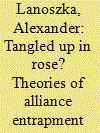

|
|
|
|
|
| Summary/Abstract |
Recent tensions between Russia and the United States have sparked debate over the value of the North Atlantic Treaty Organization (NATO). One controversy surrounds the extent to which NATO raises the risk of war through entrapment—a concept that scholars invoke to describe how states might drag their allies into undesirable military conflicts. Yet scholars have advanced different, even conflicting arguments about how entrapment risks arise. I offer a typology that distinguishes between the mechanisms through which entrapment risks allegedly emerge on the basis of their institutional, systemic, reputational, and transnational ideological sources. I use the 2008 Russo-Georgian War to illustrate how the purported mechanisms of entrapment fare in elucidating that conflict. In analyzing why entrapment risks emerge, and thinking counterfactually about The 2008 War, I argue that scholars need to disentangle the various mechanisms that drive both alliance formation and war to make sure that entrapment risks do indeed exist.
|
|
|
|
|
|
|
|
|
|
|
|
|
|
|
|
| 9 |
ID:
084227
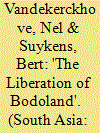

|
|
|
|
|
| Publication |
2008.
|
| Summary/Abstract |
Bodoland, located in western Assam, has been a theatre for insurgencies since the mid 1980s. Too often, migration has been the paradigmatic framework to analyse not only this, but most conflicts, raging in Assam. In this article we argue that migration in itself is insufficient to understand the problems in Bodoland. Instead, we focus on forestry and tea estates, and contend that they, forming important restrictive structures, caused tribal entrapment, finally leading to violence. Moreover, we claim that during the conflict a shift in control over these structures occurred, changing the livelihood arithmetic of the involved communities. Finally, we discuss both the restraints and opportunities of the BTC/BTAD (Bodoland Territorial Council/Bodoland Territorial Administrative District)-the result of the peace process-and warn that the escape from entrapment for the Bodo could lead to the entrapment of other communities in the area.
|
|
|
|
|
|
|
|
|
|
|
|
|
|
|
|
| 10 |
ID:
099771
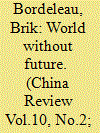

|
|
|
|
|
| Publication |
2010.
|
| Summary/Abstract |
The world offers a unique occasion to think of globalizations process as entrapment. the setting a Disney like theme park, allows for a powerful critical allegory of globalization. It is a non place a paradoxical theatre of the characters effects to form community. As underlined by Jia Zhangke in an interview, economic growth has introduced into the everyday life of the Chinese a constellation of "shows" "sort of like economic bubbles, filling up every sector of our lives". The author aims to show how The World works as a cinematic extension of this observation, by making us enter into the ob-scene conditions of production of the global spectacle and by showing its repercussions at the level of being together. The central idea of this article is to present the world as a practice of non-place and a unilaterizing itinerary for the existential malaise linked to the capitalist total mobilization. The author examines how the world can contribute to a collective demobilization through the production of a claustrophobic effect on the audience
|
|
|
|
|
|
|
|
|
|
|
|
|
|
|
|
|
|
|
|
|